Ahistoric, Unscientific Papal Prejudice Is Okay When It's About Capitalism, Anyway!
Pope Francis's Evangelii Gaudium about the "new tyranny" of "unfettered capitalism" might just be the biggest thing to hit the lefty blogosphere since Mitt Romney uttered the instantly immortal, irrelevant phrase "binders full of women."
"It's about time," says Daily Kos diarist Egberto Willies. "Great Pope or Greatest Pope?" wondered Wonkette's Commie Girl. "Pope Francis Strafes Libertarian Economics," celebrated Slate's Matthew Yglesias. It's like that time Sinead O'Connor ripped up a picture of the Pope, only this time the Pope is Sinead O'Connor, and the picture is capitalism! Yay!
I don't wish to stand in the way of people enjoying other people's prejudices, but Francis's hyperbolic rants about the role and allegedly dictatorial power of free markets are embarrassing in their wrongness. Cheering them on is like donating money to a Creationist Museum, only with more potential impact. To take one papal passage out of dozens:
Today everything comes under the laws of competition and the survival of the fittest, where the powerful feed upon the powerless. As a consequence, masses of people find themselves excluded and marginalized: without work, without possibilities, without any means of escape.

More people have escaped poverty the past 25 years than were alive on the planet in 1800. Their "means of escape" was largely the introduction of at least some "laws of competition" in endeavors that had long been the exclusive domain of authoritarian, monopolistic governments. Here's The Economist:
In 1990, 43% of the population of developing countries lived in extreme poverty (then defined as subsisting on $1 a day); the absolute number was 1.9 billion people. By 2000 the proportion was down to a third. By 2010 it was 21% (or 1.2 billion; the poverty line was then $1.25, the average of the 15 poorest countries' own poverty lines in 2005 prices, adjusted for differences in purchasing power). The global poverty rate had been cut in half in 20 years.
The country that cut poverty the most was China, which in 1980 had the largest number of poor people anywhere. China saw a huge increase in income inequality—but even more growth. Between 1981 and 2010 it lifted a stunning 680m people out poverty—more than the entire current population of Latin America. This cut its poverty rate from 84% in 1980 to about 10% now. China alone accounts for around three quarters of the world's total decline in extreme poverty over the past 30 years.
And don't forget Africa and India!
In Africa, inflation-adjusted per capita incomes rose by an astonishing 97 percent between 1999 and 2010. Hunger in India shrank by 90 percent after the country replaced 40 years' worth of socialist stagnation with capitalist reforms in 1991.
To look upon the miracles of this world and lament the lack of "means of escape" is to advertise your own ignorance. To call it a "tyranny" is to do violence to any meaningful sense of that important word (much like Francis's predecessor did with his silly "dictatorship of relativism" crack). And to make such absolutist statements as "everything comes under the laws of competition and the survival of the fittest" is to admit up front that you are not primarily interested in spreading truth, but rather in exciting popular passions. Which I suppose makes sense.
It's a free world; Pope's gonna Pope & all that. I don't go to the Vatican for global economics, and Catholics probably don't seek out Reason for spiritual guidance. And the new kid in the Vatican actually seems pretty good to my outsider eyes. But prejudice against global capitalism isn't some kind of twee affect coming from the mouth of one of the globe's largest religious institutions. It's an out-and-out attempt to rewrite measurable history to fit theological imperatives. Liberals who congratulate themselves on mocking creationists while co-signing factually laughable claims about the world they actually live in are not exactly demonstrating a consistent adherence to the Scientific Method.


Show Comments (155)